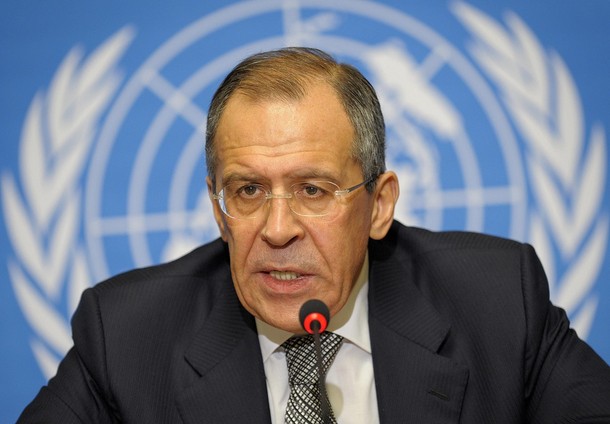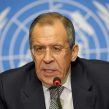
Putin’s Corrupt Ruling Elite Fear the Fate of Arab Dictatorships
Publication: Eurasia Daily Monitor Volume: 9 Issue: 23
By:

As Western nations and the Arab League are pressing a draft United Nations Security Council resolution that seeks to ease President Bashar al-Assad out of power and condemn the regime for its violence against protesters, Russia has been steadfastly resisting, threatening to use its UN Security Council veto power. Arab states and the Syrian opposition have been fruitless in trying to use Western governments to attempt to shift Moscow away from supporting al-Assad. Hopes have arisen time and again that Russia may reconsider its stand, but each time another burst of bluster from Moscow led to more deadlock. The apparent postponement of a vote in the UN Security Council on Syria this week was greeted in Moscow as a success that prevented a “Western diplomatic blitzkrieg in the UN,” since deliberations may continue for weeks (Kommersant, February 2).
Russian Foreign Minister Sergei Lavrov has accused “foreign players” of supplying arms to the Syrian opposition” (Interfax, January 29). Lavrov taunted his US counterpart Hillary Clinton, for “bemoaning” a refusal to hold urgent telephone talks on Syria and proposed: “this is the result of indescribable manners” (www.mid.ru, January 31). The Russian envoy in the UN Vitaly Churkin, supported by China, has insisted that any acceptable resolution on Syria must be based on the Russian draft, introduced on December 15, requiring a ceasefire and negotiations between the al-Assad regime and the opposition. Russia rejects any sanctions or threat of sanctions or of an arms embargo, if the al-Assad regime continues to use force. Lavrov has offered Moscow as a possible venue of future talks, but the Syrian opposition has refused to participate without an assurance that al-Assad quits power – an assurance Moscow refuses to make, since that is tantamount to unacceptable “regime change.” According to Lavrov, “Some outside powers are setting on the opposition groups to crawl away from a dialog [with al-Assad]. This is a provocation that will lead to no good” (Interfax, January 31).
The official reason of Russian stubbornness is the often expressed fear that any UN resolution rebuking al-Assad for mass murder will be used by the West as the March 2011 Security Council resolution 1973 on Libya that contained a mandate to protect civilians, but in effect led to the overthrow of Muammar Gaddafi, backed by NATO air strikes. Western assurances that no one is considering military action are not taken at face value. Lavrov pledged to continue to honor arms contracts with Syria (Interfax, January 31). At present the Russian policy seems to be to buy time for al-Assad by dragging on negotiations at the UN.
The al-Assad regime is Russia’s last long-term ally in the Middle East. Russia maintains a naval supply station in the Syrian port of Tartus – the only Russian military outpost left outside the borders of the defunct Soviet Union. During the Cold War, Russia sustained a constant and formidable naval presence in the Mediterranean, facing off NATO’s navies. The Tartus naval facility was a strategic asset providing the Soviet flotilla with constant supplies, munitions and maintenance. The Russian flotilla was recalled some 20 years ago and never returned. Today, Russian ships pass through the region infrequently and do not need Tartus; the base is mostly deserted. Only a naval maintenance support ship is permanently moored at Tartus, idling for half a year before returning to Sevastopol, Crimea, to be replaced by another maintenance ship that will idle on for another half year.
The Tartus “naval base,” with two floating piers, one maintenance ship and a small contingent of noncombat personnel, is a vestige of a lost empire, a matter of prestige with zero military significance. Arms trade is more important: In 2010, Syria imported some $700 million worth of weapons and wants more. Russian investment by state-connected corporations into the Syrian economy (most notably the natural gas sector) is estimated at some $20 billion. Without al-Assad, billions may be lost in arms deals and Russian investment would be at risk (Kommersant, February 1).
Since the Cold War, Russia maintains a high-level troop of military advisers in Syria. Russian military intelligence has an important foothold in a volatile region. If Sunni Muslim extremists Russia traditionally dislikes and distrusts take over Assad’s minority Alawite-sect secular-orientated government, Russia’s military and intelligence services would lose valuable assets.
Still, Russian support for the Syrian regime is predominately internal in nature, as is the constant recall of the Libyan example. Last March President Dmitry Medvedev and Prime Minister Vladimir Putin publicly clashed over Libya. Putin publicly denounced the Security Council Resolution 1973 as “flawed and defective” and a pretext for a “crusade.” Lavrov advocated an immediate stop of “all hostilities,” and negotiations, which would allow Gaddafi to continue to butcher the opposition – the same remedy Lavrov is today proscribing the Syrians. The Russian Foreign Ministry was ready to veto the 1973 resolution in the UN, but was overruled by Medvedev (EDM, March 24). Ambitious and well connected senator Mikhail Margelov, appointed by Medvedev as his special representative in Africa specifically to deal with the Libyan crisis, denounced Gaddafi as a bloody dictator that “must leave” (Interfax, June 21).
Today, Lavrov is assertive and getting his revenge, supported by Putin. Medvedev is stepping down as president, while Margelov, once seen as a possible Lavrov successor has fallen from grace. Last week, the Foreign Ministry suddenly issued a statement denouncing “malicious rumors that Lavrov has written a letter to the Kremlin demanding the ouster of Margelov as special representative in Africa” (Interfax, January 27). In fact, the Moscow mainstream press did not carry any such “malicious rumors” before the statement was published.
The West went after Slobodan Milosevic, Saddam Hussein and Gaddafi. They are all dead. The West will dispatch al-Assad, they will come for us, Russia’s chief justice (chairman of the Constitutional Court), Valery Zhorkin, wrote last week. The West promotes opposition movements and destroys the principle of equal sovereignty and non-interference in internal affairs by humanitarian interventions. The West is promoting a malicious pro-democracy mass movement in Russia to have a pretext to intervene and destroy our nation, writes Zhorkin (Rossiyskaya Gazeta, January 26).
Russian national interests and assets at risk in Syria do not seem to validate a steadfast stand to defend a doomed butcher, disregarding international and Arab opinion. In fact, Putin and the Russian corrupt top elite are defending not al-Assad, but themselves.




